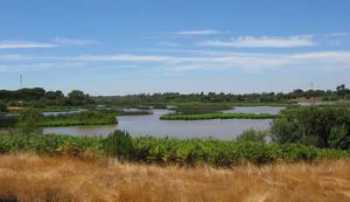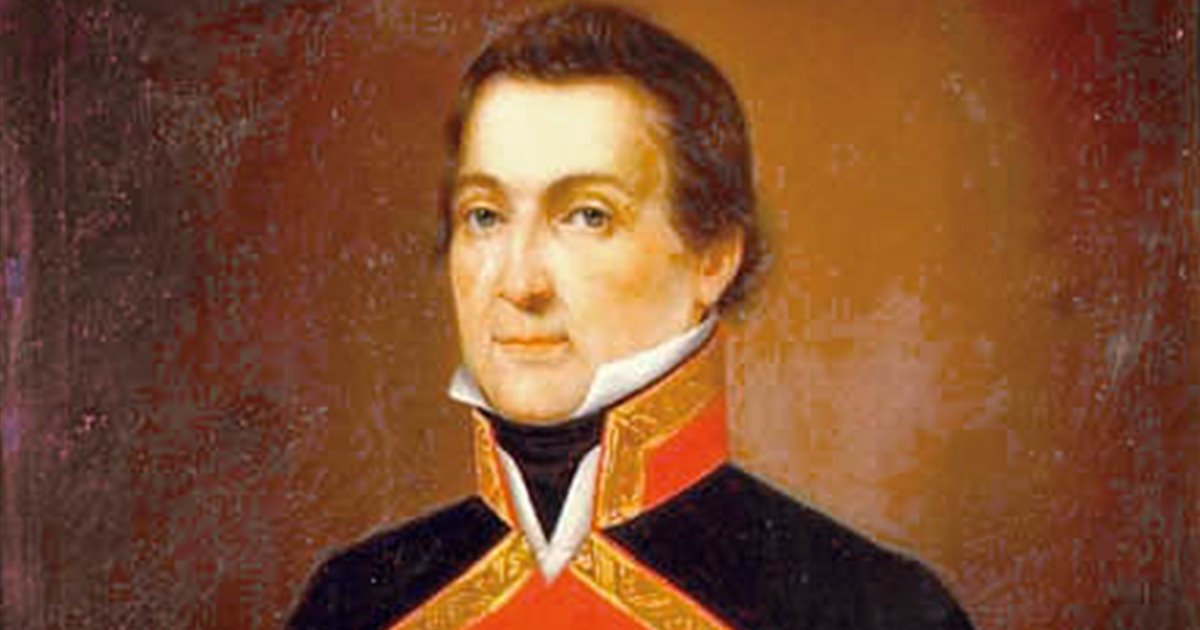November 5
Saint’s Day for Zacarías, Isabel, Eusebio and Felix
1553 - Don Luis de Velasco, Viceroy of the New Spain, inaugurates the courses of the School of Law, founded on this date and under the National Autonomous University of Mexico.
1712 - Felipe V of Spain signed a memorandum of resignation to the crown of France for him and his descendants.

Donaña Nature Park - photo www.tarifaspain.net
1810 - The French invading troops started the siege of the Isle of Leon (Cádiz).
1811 - Father José Matías Delgado rang the bells of the Iglesia la Merced in San Salvador, sounding the first call for Central America’s independence from Spain.
1813 - Uprising in Cuzco, Peru, against Spanish domination.
1815 - Jose Maria Morelos was captured by Spanish troops in Tezmalaca.
1900 - In Valencia, the Civil Guard captura the bandit Josep Pinet Martorell Llorca.
1906 - In Barcelona, Malats the pianist releases the work Triana, belonging to the poem for piano Iberia, Isaac Albéniz.
1910 - In Madrid, the last Spanish flag that flew in Havana (Cuba was when Spanish) is deposited.
1910 - Spain adopts the agreement to introduce the width of European standard gauge for its railways.
1920 - At the Royal Hospital of Santiago de Compostela they find a portrait of Carlos IV painted by Goya.
1922 - Held in Tarragona II Grand Prize Peña Rhin, won by Guiness, driving a Talbot Darracq, an average of 105 km / h.
1924 - The Cuban born boxer Jim Morán is proclaimed champion in welterweight.
1932 - The film Mata Hari, premieres in Barcelona starring Greta Garbo.
1933 - The Basque Statute of Autonomy is approved in a referendum in the Basque Country.
1934 - A new previous to publish censorship is put in place.
1944 - In Madrid is published 'Sons of anger', by Dámaso Alonso.
1950 - The UN General Assembly approves the start of diplomatic relations with Spain.
1957 - At the Queen Victoria (Madrid) theater premieres The cards face down, by Buero Vallejo.
1969 - In Barcelona (España) resigns Narcís de Carreras, president of Football Club Barcelona.
1971 - In Madrid "anti-Marxist struggle" commandos destroy 24 engravings by Pablo Picasso.
1971 - The boxer Pedro Carrasco is proclaimed world champion in light weight.
1982 - In Sevilla, John Paul II beatified the Spanish nun Angela de la Cruz.
1991 - Mysterious death of the British magnate of the press, Robert Maxwell in Canary Islands.
1992 - Cuban poet Dulce Maria Loynaz is awarded the Cervantes Prize for Literature.
1992 - Spain ratifies the European Charter for Regional or Minority Languages by acquiring among others, the commitment to recognize, respect and promote them.
1994 - the Spanish media reported that the Doñana National Park in Andalucía was to be declared a UNESCO World Heritage Centre.
1998 - The newspaper La Razón is launched,founded by Luis María Ansón.
2002 - Pontevedra two homemade bombs caused the death of a married couple and injured a man and his son.
2002 - The composer Tomás Marco and the conductor Arturo Tamayo received the National Award
2004 - The government presents the most powerful supercomputer in Europe, built by IBM.
2007 - Juan Carlos I and Sofia of Greece made a visit to the Autonomous City of Ceuta, unique in the reign.
2007 - The Royal Spanish Language Academy signed an agreement with the agency "Red.es" to spread the Spanish language and the other co-official languages on the Internet.
He is insisting they negotiate the reforms of pensions, education and regional financing.
The PSOE is putting pressure on the appearance of all the Cabinet and the leader of Ciudadanos criticised ‘a government thought for the PP and not for Spain’. ‘Rajoy and Rivera will speak to activate their pact next week’. They will agree on a controlling commission to develop 150 measures.
Births

1754 - Alejandro Malaspina, Malaspina was born in Milazzo, a small principality ruled by his family, then part of the Grand Duchy of Tuscany, a fiefdom of the Holy Roman Empire. Alessandro's parents were the Marquis Carlo Morello and Caterina Meli Lupi di Soragna. From 1762 to 1765, his family lived in Palermo with Alessandro's great-uncle, Giovanni Fogliani Sforza d'Aragona, the viceroy of Sicily. From 1765 to 1773 he studied at the Clementine College in Rome. In 1773 he was accepted into the Order of Malta and spent about a year living on the island of Malta where he learned the basics of sailing.
Malaspina entered the Royal Navy of Spain in 1774 and received the rank of Guardia marina.
Between 1774 and 1786 he took part in a number of naval battles and received many promotions. In January 1775, aboard the frigate Santa Teresa, Malaspina took part of the expedition to relieve Melilla, which was under siege by Moroccans. Shortly after he was promoted to frigate-ensign (alférez de fragata). In July 1775 he participated the siege of Algiers and in 1776 was promoted to ship's ensign (alférez de navío)
From 1777 to 1779, aboard the frigate Astrea, Malaspina made a round-trip voyage to the Philippines, rounding the Cape of Good Hope in both directions. During the voyage he was promoted to frigate-lieutenant (teniente de fragata). In January 1780 he was in the Battle of Cape Santa Maria and shortly thereafter was promoted to ship's lieutenant (teniente de navío). During the Great Siege of Gibraltar, in September 1782, Malaspina served on a "floating battery." In December of the same year, aboard the San Justo, Malaspina participated in the fighting at Cape Espartel. He was soon promoted once again, to frigate-captain (capitán de fragata).
In 1782 he was suspected of heresy and denounced to the Spanish Inquisition, but was not apprehended.
From March 1783, to July 1784, Malaspina was second-in-command of the frigate Asunción during a trip to the Philippines. As with his first trip to the Philippines the route went by the Cape of Good Hope in both directions. In 1785, back in Spain, Malaspina, on board the brigantine Vivo, took part in hydrographic surveys and mapping of parts of the coast of Spain. During the same year he was named Lieutenant of the Company of the Guardia marinas of Cádiz.
1807 - Patricio de la Escosura, literate politician (d. 1878)
1912 - Leonardo Cilaurren, footballer (d. 1969)
1913 - Jaume Sospedra, footballer (d. 1990)
1921 - José Antonio Corrales Gutiérrez, architect (d. 2010)
1927 - Emilio Lledó, philosopher and writer.
1941 - Perich, writer, illustrator and humorist (d. 1995)
1952 - Teresa Rabal, singer and actress.
1961 - Rafa Sánchez, singer in the rock band La Unión.
1965 - Kubrat, Prince of Panagyurishte, titular Bulgarian royal family, born in Madrid
1966 - Nayim, (Mohamed Al-Amar) footballer born in Ceuta
1968 - Aitana Sánchez-Gijón, Italian-Spanish actress
1976 - Raúl Cimas, comic.
1978 - Xavier Tondo, cyclist (d. 2011)
1980 - Eva González, model and actress, Miss Spain 2003, born in Sevilla
1981 - Javier Pereira, actor.
Deaths
1867 - Leopoldo O'Donnell, soldier and politician. (b. 1809)
1963 - Luis Cernuda Bidón, poet and literary critic, died in Mexico City. (b. 1902)
1973 - Joaquín Maurín, politician (b. 1896)
1994 - Mariano Yela, psychologist and philosopher (b. 1921)
1995 - Joan Ainaud de Lasarte, historian (b. 1919)
2005 - Federico Carlos Sainz de Robles y Rodríguez, judge and writer (b. 1921)
2010 - Paco Marsó, actor and theatre producer (b. 1948)
